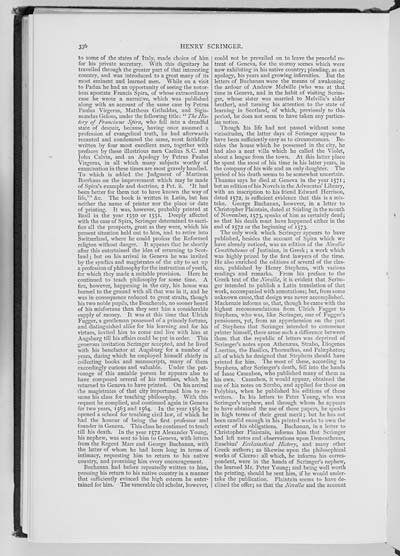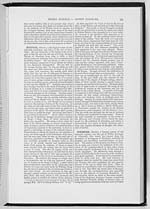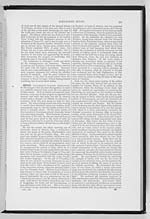33&
to some of the states of Italy, made choice of him
for his private secretary. With this dignitary he
travelled through the greater part of that interesting
country, and was introduced to a great many of its
most eminent and learned men. While on a visit
to Padua he had an opportunity of seeing the notor-
ious apostate Francis Spira, of whose extraordinary
case he wrote a narrative, which was published
along with an account of the same case by Petrus
Paulus Virgerus, Mattheus Gribaldus, and Sigis-
mundus Gelous, under the following title: " The His-
tory of Franciscus Spira, who fell into a dreadful
state of despair, because, having once assumed a
profession of evangelical truth, he had afterwards
recanted and condemned the same, most faithfully
written by four most excellent men, together with
prefaces by these illustrious men Caelius S. C. and
John Calvin, and an Apology by Petrus Paulus
Virgerus, in all which many subjects worthy of
examination in these times are most gravely handled.
To which is added the Judgment of Martinus
Borrhaus on the improvement which may be made
of Spira's example and doctrine, 2 Pet. ii. ' It had
been better for them not to have known the way of
life,'" &c. The book is written in Latin, but has
neither the name of printer nor the place or date
of printing. It was, however, probably printed at
Basil in the year 1550 or 1551. Deeply affected
with the case of Spira, Scrimger determined to sacri-
fice all the prospects, great as they were, which his
present situation held out to him, and to retire into
Switzerland, where he could profess the Reformed
religion without danger. It appears that he shortly
after this entertained the idea of returning to Scot-
land ; but on his arrival in Geneva he was invited
by the syndics and magistrates of the city to set up
a profession of philosophy for the instruction of youth,
for which they made a suitable provision. Here he
continued to teach philosophy for some time. A
fire, however, happening in the city, his house was
burned to the ground with all that was in it, and he
was in consequence reduced to great straits, though
his two noble pupils, the Boucherels, no sooner heard
of his misfortune than they sent him a considerable
supply of money. It was at this time that Ulrich
Fugger, a gentleman possessed of a princely fortune,
and distinguished alike for his learning and for his
virtues, invited him to come and live with him at
Augsburg till his affairs could be put in order. This
generous invitation Scrimger accepted, and he lived
with his benefactor at Augsburg for a number of
years, during which he employed himself chiefly in
collecting books and manuscripts, many of them
exceedingly curious and valuable. Under the pat-
ronage of this amiable person he appears also to
have composed several of his treatises, which he
returned to Geneva to have printed. On his arrival
the magistrates of that city importuned him to re-
sume his class for teaching philosophy. With this
request he complied, and continued again in Geneva
for two years, 1563 and 1564. In the year 1565 he
opened a school for teaching civil law, of which he
had the honour of being the first professor and
founder in Geneva. This class he continued to teach
till his death. In the year 1572 Alexander Young,
his nephew, was sent to him to Geneva, with letters
from the Regent Marr and George Buchanan, with
the latter of whom he had been long in terms of
intimacy, requesting him to return to his native
country, and promising him every encouragement.
Buchanan had before repeatedly written to him,
pressing his return to his native country in a manner
that sufficiently evinced the high esteem he enter-
tained for him. The venerable old scholar, however,
could not be prevailed on to leave the peaceful re-
treat of Geneva, for the stormy scenes which were
now exhibiting in his native country; pleading, as an
apology, his years and growing infirmities. But the
letters of Buchanan were the means of awakening
the ardour of Andrew Melville (who was at that
time in Geneva, and in the habit of visiting Scrim-
ger, whose sister was married to Melville's elder
brother), and turning his attention to the state of
learning in Scotland, of which, previously to this
period, he does not seem to have taken any particu-
lar notice.
Though his life had not passed without some
vicissitudes, the latter days of Scrimger appear to
have been sufficiently easy as to circumstances. Be-
sides the house which he possessed in the city, he
had also a neat villa which he called the Violet,
about a league from the town. At this latter place
he spent the most of his time in his latter years, in
the company of his wife and an only daughter. The
period of his death seems to be somewhat uncertain.
Thuanus says he died at Geneva in the year 1571 ;
but an edition of his Novels in the Advocates' Library,
with an inscription to his friend Edward Herrison,
dated 1572, is sufficient evidence that this is a mis-
take. George Buchanan, however, in a letter to
Christopher Plaintain, dated at Stirling in the month
of November, 1573, speaks of him as certainly dead;
so that his death must have happened either in the
end of 1572 or the beginning of 1573.
The only work which Scrimger appears to have
published, besides the account of Spira which we
have already noticed, was an edition of the Novella
Constitutiones of Justinian, in Greek; a work which
was highly prized by the first lawyers of the time.
He also enriched the editions of several of the clas-
sics, published by Henry Stephens, with various
readings and remarks. From his preface to the
Greek text of the Novella, it is evident that Scrim-
ger intended to publish a Latin translation of that
work, accompanied with annotations; but, from some
unknown cause, that design was never accomplished.
Mackenzie informs us, that, though he came with the
highest recommendations from Ulrich Fugger to
Stephens, who was, like Scrimger, one of Fugger's
pensioners, yet, from an apprehension on the part
of Stephens that Scrimger intended to commence
printer himself, there arose such a difference between
them that the republic of letters was deprived of
Scrimger's notes upon Athenaeus, Strabo, Diogenes
Laertius, the Basilics, Phornuthus, and Palsephatus;
all of which he designed that Stephens should have
printed for him. The most of these, according to
Stephens, after Scrimger's death, fell into the hands
of Isaac Casaubon, who published many of them as
his own. Casaubon, it would appear, obtained the
use of his notes on Strabo, and applied for those on
Polybius, when he published his editions of these
writers. In his letters to Peter Young, who was
Scrimger's nephew, and through whom he appears
to have obtained the use of these papers, he speaks
in high terms of their great merit; but he has not
been candid enough in his printed works to own the
extent of his obligations. Buchanan, in a letter to
Christopher Plaintain, informs him that Scrimger
had left notes and observations upon Demosthenes,
Eusebius' Ecclesiastical History, and many other
Greek authors; as likewise upon the philosophical
works of Cicero: all which, he informs his corres-
pondent, were in the hands of Scrimger's nephew,
the learned Mr. Peter Young; and being well worth
the printing, should be sent him, if he would under-
take the publication. Plaintain seems to have de-
clined the offer; so that the Novella and the account

![]() Universal Viewer |
Universal Viewer | ![]() Mirador |
Large image | Transcription
Mirador |
Large image | Transcription
![]()

